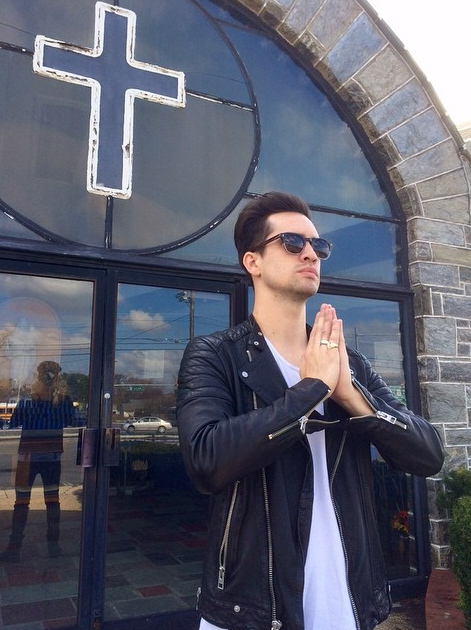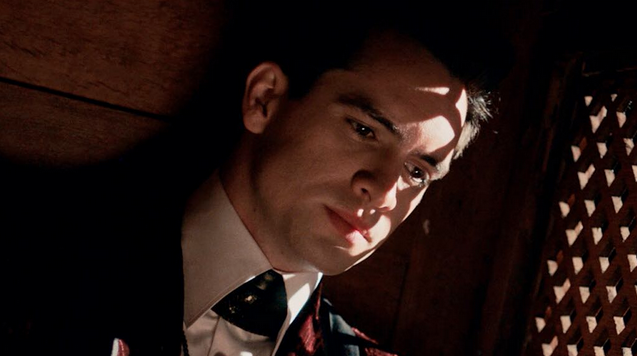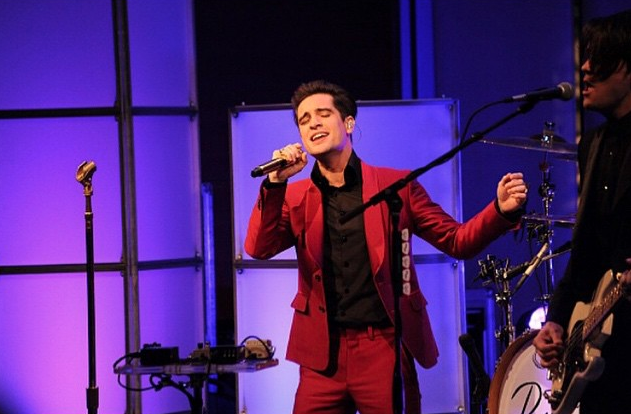What does "Hallelujah" by Panic! at the Disco mean?
April 20th, Panic! at the Disco put out a new single from an upcoming (but unknown) album. The single is "Hallelujah," and it's catchy. Like really catchy. The song made it into the top 40 on Billboard, and just three days ago, the music video came out. Viewers have described the video as being like a video game. In it, Panic! at the Disco frontman Brendon Urie chases a mysterious woman through a variety of corridors and optical illusions. He finally catches her when he embraces the illusions himself and trusts that something he can't see will catch him.
The music of "Hallelujah" is what most expect of Panic! at the Disco. It's classic alternative rock with a soaring, lilting chorus that makes you want to dance. Of course, Brendon Urie's unique voice is a fantastic addition that makes the song sound several times more interesting than it would otherwise. "Hallelujah" is musically a good song, and the lyrics are anything but meaningless and boring.
"Hallelujah" Lyrics Meaning
"Hallelujah's" meaning is complicated and more so because it includes an allusion to the band's own mythos and history with its fans. Thankfully, Brendon Urie, the writer, has done several interviews in which he's explained the song for his listeners.
In the Intro, Urie sings, "Ohh! / A moment you'll never remember / And a night you'll never forget! / Ohh!" as a way to excite his listeners and, through the paradox, to let them know that this song is going to be deep and meaningful while also being exciting and entertaining.
In the chorus, Urie sings, "All you sinners stand up, sing hallelujah (hallelujah!)." As he says in an interview with ALT 98.7, "There’s a little tagline in there that I throw out to our fans, I like to call them my sinners, and I’m a fellow sinner, and so I think that’s a special little throw-out to them." Not only does Urie give his audience a banner to stand under in this name but identifies with them to build community.
He continues singing "Show praise with your body / Stand up, sing hallelujah (hallelujah!) / And if you can't stop shaking, lean back / Let it move right through ya (hallelujah!) / Say your prayers." The use of "Hallelujah" seems to be ironic. Urie isn't praising God but instead is creating an atmosphere similar to that of a church service, suggesting that something is being worshipped and felt. What is it? It could be his listeners. What follows is a post from his website at the time of the release of "Hallelujah":
"Hallelujah" seems to be a celebration of how close Urie feels with his listeners and how much they have in common. What does Urie have in common with the sinners? The Verse is the first step in finding out.
He sings, "My life started the day I got caught / Under the covers / With secondhand lovers." Urie woke up from his normal way of thinking when he got caught having sex with women who were not his wife and who he may not have loved. They were "secondhand" "pretty young things," so he realized he was in "a state of emergency." This awareness prompted him to ask, "Who was I trying to be?"
In the Pre-Chorus, he won't stay sad for long. That time "is over" even though he misses his old ways deeply. However, he claims that "being blue is better than being over it." Here, he's saying that it's better to accept what you've done and to accept your status as a sinner rather than to try to pretend like you're perfect.
In an interview with Mashable,Urie says, "Religion was a huge part of my life. I was raised in the Mormon faith, and I can’t really deny too much of it. I spent, shit, more than half of my life in church, and it was kind of a no-brainer to want to sing about accepting responsibility for stuff I’ve done in the past. It’s really kind of touching on that religious connotation. I don’t affiliate with any religion specifically, but I do like to think that when I’m creating music, it’s a very spiritual thing. So I do want to kind of create this idea that you don’t need religion — you need whatever makes you happy."
For Urie this results in a complex relationship between acceptance of guilt and a willingness to ignore what religion has to say about it. For the Urie, the guilt simply is, and you can't do anything about it other than to accept it as a part of who you are.
In the Second Verse, Urie mentions another situation he feels guilty about: "I was drunk and it didn't mean a thing / Stop thinking about / The bullets from my mouth." At one point, he had too much to drink and said terrible things to someone. He admits that he doesn't like this person even still when he sings, "I love the things you hate about yourself." He understands that he gets joy from this person's sorrow and that he maybe even spends time thinking about the things wrong with that person: "Just finished a daydream."
But the Pre-Chorus gives the same message as before. He did something wrong--everyone has--and he's not going to ignore it. He knows who he is, and he'll take responsibility for it even if he doesn't plan to change his ways.
In the bridge, he sings, "No one wants you when you have no heart and / I'm sitting pretty in my brand new scars and / You'll never know if you don't ever try again." He doesn't want to be heartless, and he's made mistakes that he can't change, but he wants to try again. He urges his audience to try with him--that after they've accepted what they've done wrong, they should try to do what's right again--that they should do better next time.
The Music Video
The music video shows Urie chasing a mysterious woman through a video game-like labyrinth of optical illusions and puzzles. He's only able to catch up to her when he jumps into what looks like empty space and lands on a camouflaged walkway. Throughout this time, another version of him sits in a confessional, confessing sins to a priest version of him.
Thankfully, explaining the music video is easy as Urie has done the hard work. In the interview with Mashable, he says, "When I’m sitting in my confessional, basically, I’m playing two different characters. I’m playing the sinner, and I’m playing the priest. As the priest, I’m trying to convince myself that it’s all okay, that I’ll absolve you of your sins and try to comfort you, and the sinner just isn’t having it. In the sinner’s mind, there’s this puzzle going on — I’m chasing this girl through this story that I’ve woven for myself and I can’t seem to break the puzzle. I’m trying to defeat it in order to have some kind of catharsis."
Because in the end Urie does get the girl, he evidently does break the puzzle. The sinner side of him has worked through his guilt on his own without help from the priest. Urie has accepted the rules of the maze inside his mind and come out victorious. He is guilty, and he is okay with that. He will continue to try again.
What did you think of "Hallelujah" by Panic! At The Disco? Did you enjoy it? What do you think of what Urie says about accepting one's own guilt and working through it on one's own? Does this work? Thanks for reading!








